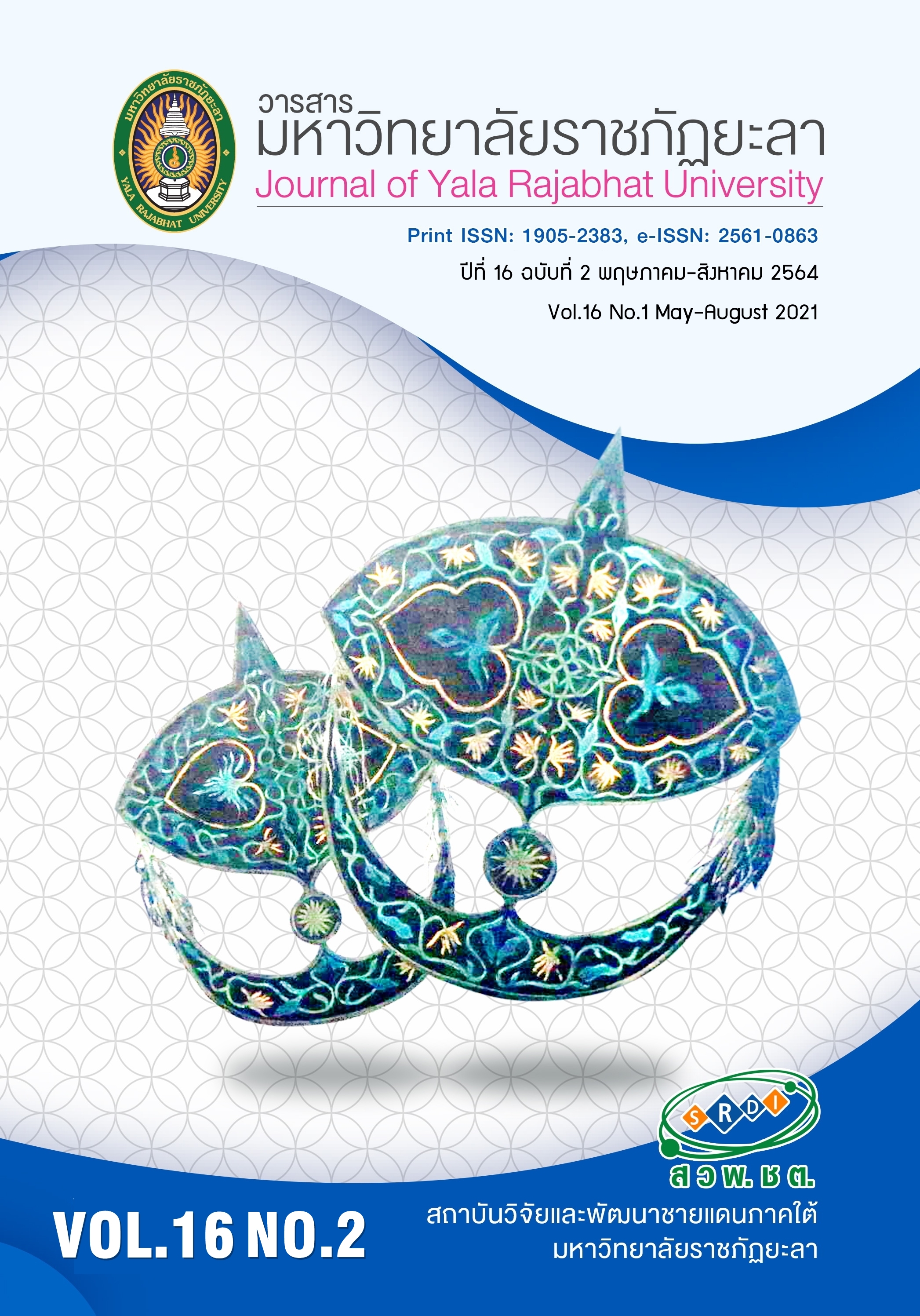การพัฒนาการรู้เรื่องคณิตศาสตร์ด้วยการจัดการเรียนรู้โดยวิธีการแบบเปิด กรณีศึกษาการสอนนักเรียนชั้นมัธยมศึกษาปีที่ 4 เรื่อง หลักการนับเบื้องต้น
Main Article Content
บทคัดย่อ
การรู้เรื่องคณิตศาสตร์เป็นสมรรถนะสำคัญอย่างหนึ่งที่เน้นการนำความรู้ทางคณิตศาสตร์ไปประยุกต์ในในชีวิตจริง แต่ผลการประเมิน PISA ด้านการรู้เรื่องคณิตศาสตร์ของนักเรียนไทยยังต่ำกว่าค่าเฉลี่ยของ OECD งานวิจัยนี้จึงมีวัตถุประสงค์เพื่อศึกษาผลการจัดการเรียนรู้โดยใช้วิธีการแบบเปิดที่มีต่อการรู้เรื่องคณิตศาสตร์ เรื่อง หลักการนับเบื้องต้น ของนักเรียนชั้นมัธยมศึกษาปีที่ 4 กลุ่มเป้าหมายที่ใช้ในการวิจัยเป็นนักเรียนชั้นมัธยมศึกษาปีที่ 4 จำนวน 14 คน ของโรงเรียนมัธยมศึกษาขนาดเล็กแห่งหนึ่งในจังหวัดสุโขทัย โดยใช้รูปแบบการวิจัยเชิงปฏิบัติการในชั้นเรียนตามวงจร PAOR จำนวน 3 วงจรปฏิบัติการ เครื่องมือที่ใช้ในการวิจัย ได้แก่ แผนการจัดการเรียนรู้ ใบกิจกรรม และแบบทดสอบการรู้เรื่องคณิตศาสตร์ ดำเนินการวิเคราะห์ข้อมูลโดยใช้วิธีการวิเคราะห์แยกประเด็น ผลการวิจัยพบว่า นักเรียนส่วนใหญ่มีการรู้เรื่องคณิตศาสตร์ในระดับดี กล่าวคือ 1) นักเรียนสามารถระบุประเด็นทางคณิตศาสตร์ของปัญหาในชีวิตจริงได้อย่างถูกต้อง สมบูรณ์ และนำเสนอสถานการณ์โดยใช้ตัวแปร สัญลักษณ์ แผนภาพให้อยู่ในรูปอย่างง่ายได้อย่างถูกต้องบางส่วน 2) นักเรียนเลือกวิธีการที่สามารถแก้ปัญหาได้อย่างถูกต้อง เหมาะสม สอดคล้องกับปัญหา และนำวิธีการแก้ปัญหาไปใช้ได้อย่างถูกต้อง แต่การแสดงลำดับขั้นตอนของการแก้ปัญหายังไม่ชัดเจน และสรุปคำตอบได้ถูกต้องบางส่วน และ 3) นักเรียนสามารถตีความผลลัพธ์ได้ถูกต้องและอธิบายความสมเหตุสมผลของวิธีการได้ ดังนั้นในการพัฒนาการรู้เรื่องคณิตศาสตร์ ครูควรเลือกหรือออกแบบสถานการณ์ปัญหาปลายเปิดที่หลากหลายรูปแบบและเชื่อมโยงกับชีวิตจริง ควรเปิดโอกาสให้นักเรียนได้อภิปรายโต้แย้งถึงความสมเหตุสมผลของผลลัพธ์และวิธีการแก้ปัญหา
Article Details
บทความ ข้อมูล เนื้อหา รูปภาพ ฯลฯ ที่ได้รับการเผยแพร่ในวารสารมหาวิทยาลัยราชภัฏยะลานี้ ถือเป็นลิขสิทธิ์ของวารสารมหาวิทยาลัยราชภัฏยะลา หากบุคคลหรือหน่วยงานใดต้องการนำทั้งหมดหรือส่วนหนึ่งส่วนใดไปเผยแพร่ต่อหรือกระทำการใดๆ จะต้องได้รับอนุญาตเป็นลายลักษณ์อักษรจากวารสารมหาวิทยาลัยราชภัฏยะลาก่อนเท่านั้น
เอกสารอ้างอิง
Altun, M. & Bozkur, I. (2017). A new classification proposal for mathematical literacy problems. Education and Science, 42(190), 171 – 188.
Boonmaton, R., Supap, S. & Wiriyapong, R. (2017). The development of grade 11 student’s mathematical literacy on probability using context-based learning. Academic Services Journal Prince of Songkla University, 29(2), 51-61. (in Thai)
Inprasitha M. (2004). Open approach as a teaching approach in Japanese mathematics classroom. KKU Journal of Mathematics Education, 1(1), 1-17. (in Thai)
Kanthawat, C., Supap, W. & Klineam, C. (2019). The development of learning activities based on mathematical modelling process to promote grade 11 students’ mathematical literacy in topic of sequences and series. Journal of Education of Burapha University, 30(1), 138-152. (In Thai)
Yu, K., Fan, S. & Lin, K. (2014). Enhancing students’ problem-solving skills through context-based learning. International Journal of Science and Mathematics Education, 13(3), 1377-1401.
Kijkuakul, S. (2014). Learning science directions for teachers in the 21st century. Phetchabun: Juldiskarnpim. (in Thai)
Makanong, A. (2010). Mathematical skills and processes: Development for development. Bangkok: Chulalongkorn University Printing House. (in Thai)
Organisation for Economic Co-operation and Development. (2018). PISA for development assessment and analytical framework: Reading, Mathematics and Science [Online]. Retrieved October 9, 2019, from: http://dx.doi.org/10.1787/9789264305274-en.
Srithi, K., Supap, S. & Wiriyapong, R. (2018). An action research on developing problem - based learning activities to enhance Mathematical literacy in conic sections topic of students in grade 10. Social Sciences Research and Academic Journal, 13(31), 105-118. (in Thai)
Stephanie, H. (2012). Developing real-world math through literacy. Ohio Journal of School Mathematics, 65(11), 24-19.
The Institute for the Promotion of Teaching Science and Technology. (2014). Mathematics, reading and science. What can students know and what can they do. Bangkok: Aroon Kranpim. (in Thai)
The Institute for the Promotion of Teaching Science and Technology. (2018). Assessment PISA 2015 reading science and mathematics: Excellence and equality in education. Bangkok: Success publication. (in Thai)
Viseu, F., & Oliveira, I.B. (2012). Open - ended tasks in the promotion of classroom communication in mathematics. International Electronic Journal of Elementary Education, 4(2), 287 - 300.


